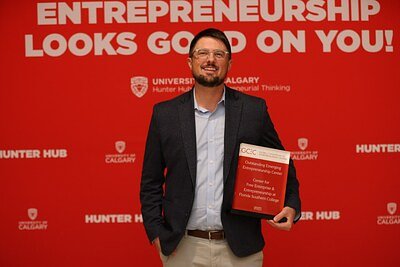
FSC’s ‘Entrepreneurship for All’ Model Gains National Recognition
Florida Southern College’s Seed-to-Scale program is reimagining entrepreneurship education, engaging 11% of its student body and earning national acclaim. Is this the future of innovation in higher ed?
FSC’s ‘Entrepreneurship for All’ Model Gains National Recognition
LAKELAND, Fla. – Florida Southern College’s (FSC) Center for Free Enterprise and Entrepreneurship (CFEE) has been named the 2025 Outstanding Emerging Entrepreneurship Center by the Global Consortium of Entrepreneurship Centers (GCEC), a testament to its innovative approach to fostering student entrepreneurship. But what sets FSC apart isn't simply the award – it’s the sheer scale of its impact, with over 400 students – 11% of the entire student body – actively participating in its Seed-to-Scale program.
While many universities treat entrepreneurship as a niche offering for business majors, FSC is fundamentally rethinking that model. The Seed-to-Scale program isn’t a separate silo; it’s woven into the fabric of the entire college, encouraging students from all disciplines – from the arts and sciences to humanities – to explore entrepreneurial thinking and launch their own ventures.
“We see entrepreneurship as a continuation piece for every project-based class or idea on a college campus,” explains Justin Heacock, Executive Director of the CFEE. “With the rapid changes in technology and AI, it’s crucial that every student be exposed to entrepreneurship in some way to stay competitive in the next economy.”
Beyond the Business School: An Interdisciplinary Approach
The emphasis on inclusivity is a key differentiator for FSC. Unlike programs often focused on high-tech startups, Seed-to-Scale supports a diverse range of student-led initiatives. “We've seen students from the art department launching creative businesses, biology students developing sustainable solutions, and even English majors creating innovative content platforms,” says a faculty member involved in the program. “It’s not just about creating the next unicorn; it's about empowering students to solve problems and create value in any field.”
This interdisciplinary approach is intentionally fostered through cross-listed courses, collaborative projects, and mentorship opportunities. Students are encouraged to leverage their unique skillsets and perspectives, creating a dynamic and innovative learning environment.
“The program really pushed me to think outside the box and apply my knowledge in new ways,” explains a recent graduate who launched a social enterprise focused on sustainable agriculture. “I never considered myself an entrepreneur, but the Seed-to-Scale program gave me the tools and confidence to turn my passion into a viable business.”
A Local Economic Catalyst
The impact of FSC’s program extends beyond the campus. Seed-to-Scale is demonstrably contributing to the local and regional economy. The college has become a hub for innovation and entrepreneurship, attracting talent and investment to the Lakeland area.
“We've seen a significant increase in the number of student-led ventures launching in the community,” notes a local economic development professional. “These businesses are creating jobs, driving economic growth, and revitalizing local neighborhoods.”
The program actively connects students with local businesses, mentors, and investors, providing them with the resources and support they need to succeed.
“The college really wants to see these businesses thrive,” explains a faculty member. “We’re committed to providing ongoing support and mentorship to our alumni, even after they graduate.”
Leveraging Technology for Scalability and Impact
FSC’s success isn’t solely based on its innovative curriculum and interdisciplinary approach. The college has also strategically leveraged technology to enhance the program's reach and impact. A key partnership with Kanu, an entrepreneurial learning platform, provides students with access to a wealth of resources, tools, and mentorship opportunities.
“Kanu has been instrumental in scaling our program and providing personalized support to our students,” explains Heacock. “The platform allows us to track student progress, identify areas for improvement, and provide targeted resources to help them succeed.”
The platform also facilitates collaboration and networking, connecting students with mentors, investors, and industry experts.
A Model for the Future?
While FSC’s Seed-to-Scale program is unique, it raises an important question: is this the future of entrepreneurship education? As universities face increasing pressure to demonstrate their economic and social impact, programs that prioritize inclusivity, interdisciplinary collaboration, and local engagement are likely to become increasingly important.
“We’re seeing a shift in the way universities approach entrepreneurship,” says a higher education consultant. “The traditional model of focusing solely on high-tech startups is no longer sufficient. Students need to be equipped with the skills and mindset to create value in any field, and programs like FSC’s Seed-to-Scale are leading the way.”
FSC’s success suggests that a broader, more inclusive approach to entrepreneurship education can not only empower students but also drive economic growth and foster innovation within the local community. As more universities begin to embrace this model, we can expect to see even greater impact in the years to come.
“We’re not just teaching students how to start businesses,” concludes Heacock. “We’re teaching them how to think creatively, solve problems, and make a positive impact on the world.”
